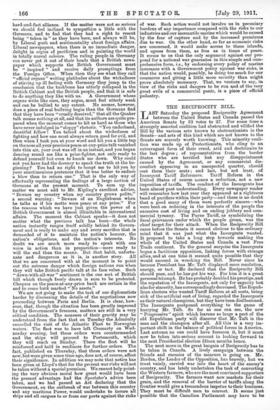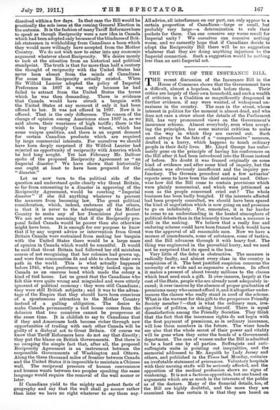THE RECIPROCITY BILL.
TAST Saturday the proposed Reciprocity Agreement between the United States and Canada passed the American Senate by 53 votes to 27. For some time a. strangely assorted coalition had obstructed and vilified the Bill by the various arts known to obstructionists in the Senate—and arts of this kind which are not known to the Senate are scarcely worth knowing. This minority coali- tion was made up of Protectionists, who cling to an extravagant form of their creed, arid and doctrinaire to the last degree ; of representatives from the border States who are terrified lest any disappointment caused by the Agreement, or any commercial dis- comfort appearing in an unexpected quarter, should cost them their seats ; and last, but not least, of Insurgent Tariff Reformers. Tariff Reform in the United States of course means a reduction, not a new imposition of tariffs. The conduct of the Insurgents has been almost past understanding. Every newspaper reader will remember how last year they appeared as a righteous band of purifiers within their party—and there is no doubt that a good many of them were perfectly sincere—who were bent on reducing in the interests of the people the excessive cost of living and on ending jobbery and com- mercial tyranny. The Payne Tariff, as symbolizing the fiscal grievances under which the people groan, was the chief target for their attack. When the Reciprocity Bill came before the Senate it seemed obvious to the ordinary mind that it was just what the Insurgents wanted. It proposed to take a long step towards making the whole of the United States and Canada a vast Free Trade continent. To the general surprise the Insurgents began a factitious opposition, linking forces with strange allies, and at one time it seemed quite possible that they would succeed in wrecking the Bill. Never since he became President has Mr. Taft displayed more resolution, energy, or tact. He declared that the Reciprocity Bill should pass, and he has got his way. For him it is a great personal triumph. He has probably doubled his prestige, and the reputation of the Insurgents, not only for sagacity but also for sincerity, has correspondingly decreased. The Repub- lican electors who wanted Tariff Reform at all costs, being sick of the artificial cost of living, regarded the Insurgents as their natural champions, but they have been disillusioned. The Insurgents postponed everything to the game of harrying Mr. Taft. So far as one can see, the new " Progressive" spirit which leavens so large a part of the old Republican party will discover that Mr. Taft is the man and the champion after all. All this is a very im- portant shift in the balance of political forces in America. Last autumn no one could have foreseen it, but it must now be taken into serious account in looking forward to the next Presidential election fifteen months hence.
The next move in the great bargain of Reciprocity has to be taken in Canada. A lively campaign between the friends and enemies of the measure is going on. Mr. Borden, the Leader of the Opposition, has bravely, but we trust vainly, carried war into the heart of the enemy's country, and has lately undertaken the task of converting the Western farmers, who are the most convinced supporters of Reciprocity. The farmers want new markets for their grain, and the removal of the barrier of tariffs along the frontier would give a tremendous impetus to their business. They must be difficult men to convert. It seems just possible that the Canadian Parliament may have to be dissolved within a few days. In that case the Bill would be practically the sole issue at the coming General Election in the autumn. It is the fashion of many Tariff Reformers here to speak as though Reciprocity were a new idea in Canada which had been adopted only because of the blindness of Brit- ish statesmen in withholding from Canadians a boon which they would more willingly have accepted from the Mother Country. We do not wish now to enter into any economic argument whatever about Reciprocity. We desire merely to look at the situation from an historical and political standpoint. The truth is that for more than half a century the thought of reciprocity with the United States has never been absent from the minds of Canadians. For some time Reciprocity actually existed. When Sir Wilfrid Laurier adopted the policy of Imperial Preference in 1897 it was only because he had failed to extract from the United States the terms which he was then demanding. There is evidence that Canada would have struck a bargain with the United States at any moment if only it had been offered to her. It was not offered in 1897. Now it is offered. That is the only difference. The reason of the change of opinion among Americans since 1897 is, as we said above, their weariness of high tariffs ; there is the wish to buy cheaply Canadian wheat, which has some unique qualities, and there is an urgent demand for certain Canadian products which are required by large commercial interests. For ourselves we should have been deeply surprised if Sir Wilfrid Laurier had rejected an opportunity of reciprocity with America which he had long sought. Yet last February Mr. Balfour spoke of the proposed Reciprocity Agreement as " an Imperial disaster." We have shown that historically one ought at least to have been prepared for the " disaster."
Let us now turn to the political side of the question and understand quite clearly why Great Britain, so far from consenting to a disaster in approving of the Reciprocity Agreement, would be courting "Imperial disaster" if she did anything whatever to prevent the measure from becoming law. The great political consideration, which, indeed, embraces all the others, is that it is never to the advantage of the Mother Country to make any of her Dominions feel poorer. We are not even assuming that if the Reciprocity pro- posal failed Canada would be poorer than she otherwise might have been. It is enough for our purpose to know that if by any urgent advice or intervention from Great Britain Canada were restrained from making her bargain with the United States there would be a large mass of opinion in Canada which would be resentful. It would be said that Great Britain had followed her old mistaken course of not recognizing that her colonies had grown up, and were free communities fit and able to choose their own path in the world. This is what actually happened before 1845, when preference was widely looked upon in Canada as an onerous bond which made the colony a kind of tied house. Let us grant that the Canadians who felt this were quite wrong and misguided and were utterly ignorant of political economy : they were still Canadians ; they were still British subjects ; and it was to the advan- tage of the Empire that they should have been conscious of a spontaneous attraction to the Mother Country instead of a galling obligation. The desire to make Canada permanently a tied house comes from the delusion that two countries cannot be prosperous at the same time. It is childish to say to Canadians that if they and Americans both become richer through new opportunities of trading with each other Canada will be guilty of a disloyal act to Great Britain. Of course we' know that Tariff Reformers here do not say that directly; they put the blame on British Governments. But there is no escaping the simple fact that, after all, the proposed Reciprocity Agreement is an instrument between the responsible Governments of Washington and Ottawa. Along the three thousand miles of frontier between Canada and the United States it is impossible to maintain a Chinese wall. The reciprocal pressure of human convenience and human wants between two peoples speaking the same language would require the removal of the wall sooner or later.
If Canadians yield to the mighty and potent facts of geography and say that the wall shall go sooner rather than later we have no right whatever to say them nay. All advice, all interference on our part, can only appear to a certain proportion of Canadians—large or small, but probably very large—a determination to rule their pockets for them. Can one conceive any worse result for Imperial unity ? We ourselves can conceive nothing worse, and we earnestly hope that if Canadians decide to adopt the Reciprocity Bill there will be no suggestion whatever that they are doing anything injurious to the Imperial connection. Such a suggestion would be nothing less than an. anti-Imperial act.







































 Previous page
Previous page